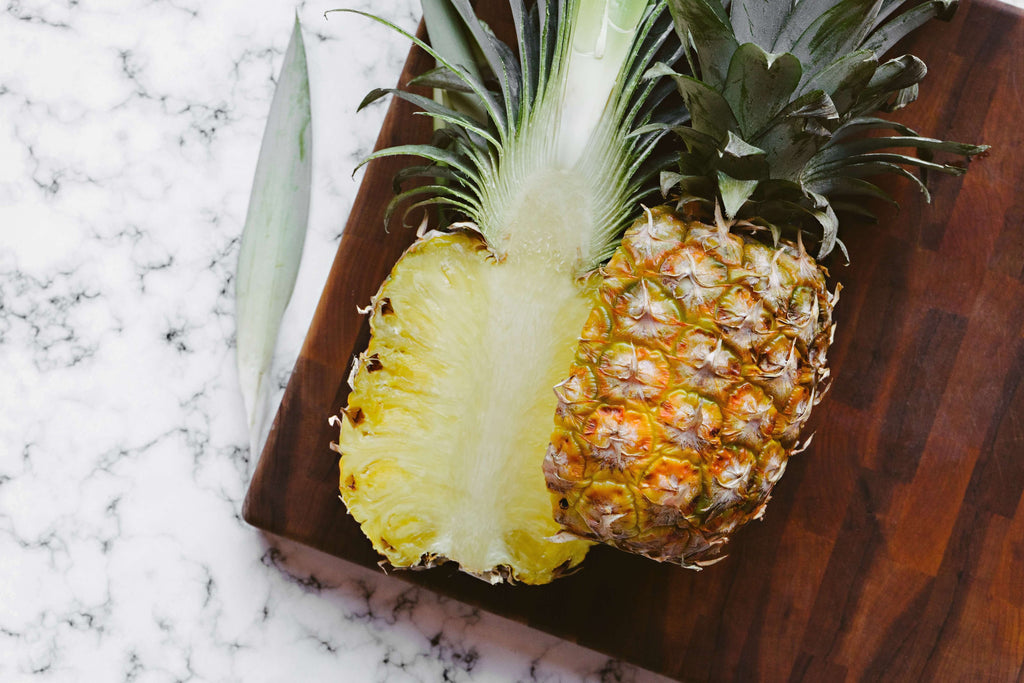
Can Dogs Eat Pineapple? Is It Good For Dogs?
Yes, dogs can eat Pineapple and they can even see a few potential health benefits from this tasty fruit.
The good news: your dog is an omnivore. You may be wondering how to incorporate more nutrients into your pup's daily serving of chow. But does that include pineapple?
Pineapple is not toxic to dogs. There is no danger in feeding your dog small amounts of pineapple. Like humans, dogs cannot process the core. They may try to chew off large parts of the pineapple core, as they may assume it is edible. You can always check with your veterinarian if you want to be sure your dog doesn't have any unusual food allergies.
Some dogs may be sensitive to pineapple the same way some people can be lactose intolerant. As with any new food, you will want to observe your dog the first time they try pineapple. (This is discussed in our Can Dogs Eat Strawberries article.)
Benefits of Feeding Pineapple to Your Dog
Now that you know more about what pineapple has to offer in general, how can it benefit your dog?
Raw pineapple has many vitamins and minerals. The sweet pineapple has loads of Vitamin C, as well as Vitamin B6, Folate, and Manganese. Since pineapple is mostly water, it helps your dog stay cool and hydrated.
Fresh pineapple is low in sugar, which makes it healthier than other foods that might be present at the dinner table. Fresh pineapple also contains minerals like manganese, copper, potassium, magnesium, iron, and more. (This is something we also talked about in our can dogs eat bananas article.) 
Pineapple tastes like a tropical vacation!
Things You Should Know Before Feeding Pineapple to Your Dog
Like watermelon or strawberries, pineapple should serve as a snack or occasional treat, not a full meal by itself.
Only Feed Your Dog Pineapple In Moderation
While you don't need to measure your servings down to the gram, you will want to have a good idea of how much fruit your dog is eating on a daily basis. When serving fruits and veggies for dogs, avoid using table scraps. Let your dog know which snacks are yours and which are theirs. If your dog food already has some fruits and veggies in it, then factor that in before serving up fruit-based snacks.
Can Dogs Eat Pineapple Core?
The short answer is: no, dogs can't eat a pineapple core or skin. Pineapple is healthiest when served fresh, with no rind or core. Dogs should not be fed canned pineapple - or any canned food that is packed in syrup. The syrup tends to have lots of sugar, something your dog's tummy won't like. Pineapple is only healthy in moderation.
Feeding your dog too much fruit can make them sick or potentially lead to digestive upset. Your dog needs protein and fats to balance their diet, not just fruits. The best way to serve dogs pineapple is in small chunks. If the dog likes it, spread out the servings so they have room to eat other food, as well.
Keep in mind the size and build of your pup. Pineapple contains about 74 calories and 14 grams of sugar per cup. A toy-breed dog would need much smaller servings than a large dog.
Fun Ways to Feed Pineapple to Your Dog
Pineapples are a great tasting, healthy snack however you prep it. Grill small chunks of pineapple (be careful not to burn it!) and serve some to your pup. Let cool and serve one grilled chunk at a time. The smokey flavor and added sweetness will leave your pup begging for more.
Blend several servings of fresh pineapple with dairy-free yogurt and freeze overnight. It will taste a bit like ice cream but without all the sugar. You may find yourself sneaking into the freezer for a bite of frozen pineapple, too!
Another great idea is to dehydrate pineapple. Dried pineapple is a quick and easy snack for at home or when out and about. Dried pineapples last a long time, allowing you to spread out servings easily. You can save some for a day out on the trails or at the dog park!
If you don't have a food dehydrator, set your oven on the lowest setting, and perhaps leave the oven door cracked to lower the temperature even further. Check on your treats in a couple of hours, then every 15 minutes or so. Storing your dried treats is easy. Just seal them in an airtight container (out of reach of your pup).
Improve Your Dog's Nutrition With Pineapple & Other Fruits
As you incorporate more fresh fruits and veggies into your dog's favorite snacks or desserts, you may find your dog craving fresh ingredients more often! Take this as a sign of success. Your dog is feeling the benefits of a healthier, balanced diet. While you are limited in how much fresh fruit you serve your dog, you can regularly feed your dog food that uses the same quality of ingredients.
Final Thoughts On Feeding Pineapple to Dogs
There's no better feeling than the one you get from raising a happy and healthy dog. Now that you've learned more about the many benefits of serving dogs pineapple, you'll want to start serving it asap.



























